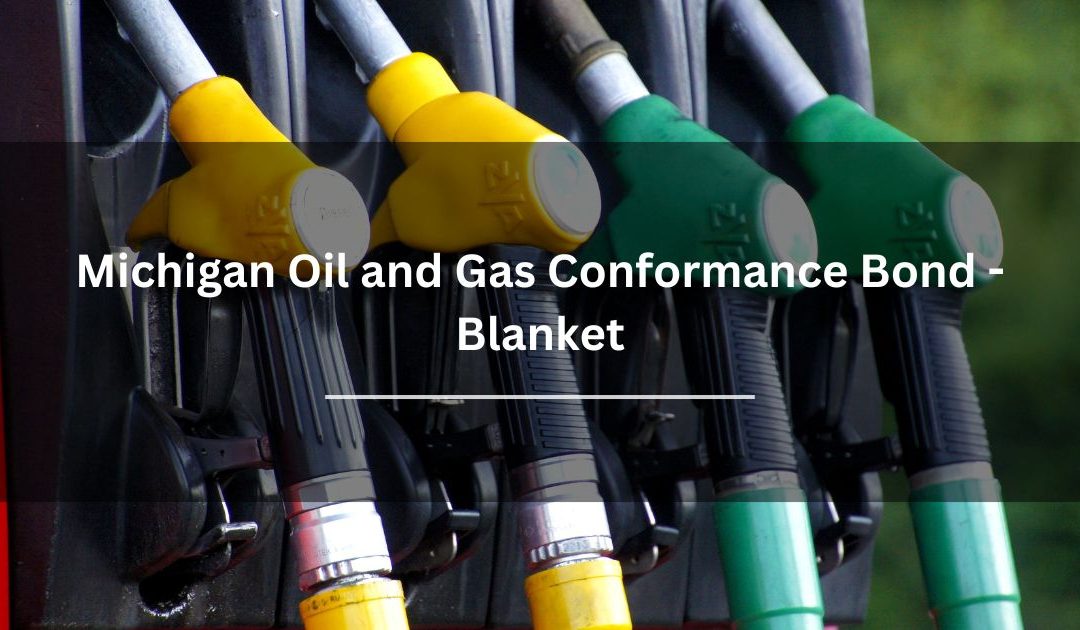Get an Instant on Oil and Gas Conformance Bond
Introduction
From our perspective, energy companies in Michigan understand the weight of environmental responsibility. If you’re operating multiple oil and gas wells across the state, your business isn’t just about production—it’s about stewardship. The Michigan Department of Environment, Great Lakes, and Energy (EGLE) requires a conformance bond to protect landowners and public resources from improperly abandoned or neglected wells. For large-scale operators, the Michigan Oil and Gas Conformance Bond - Blanket offers a way to cover multiple sites with a single, comprehensive financial assurance.
This surety bond serves as a safeguard. It guarantees that if a company fails to plug a well or restore a drilling site in compliance with state rules, EGLE can draw on the bond to complete the work. The blanket version simplifies this process for companies managing many wells, consolidating their obligations under one bond rather than requiring individual coverage per well.
Just like the Michigan - Uniform Motor Vehicle Certificate of Title Bond clears a path for rightful vehicle ownership, this bond clears regulatory pathways for resource developers—helping them stay compliant, maintain trust, and focus on operations.

Why Bonding Requirements Cause Confusion in the Industry
We’ve noticed that many operators are unsure whether they need a blanket conformance bond or individual bonds. The distinction isn’t always obvious until paperwork is submitted—or rejected. Michigan requires conformance bonds for all oil and gas operations to cover site restoration. But the amount and type of bond depend on the number of wells a company operates.
Smaller operators often default to single-well bonding without realizing they may qualify for—or benefit from—a blanket bond. This leads to missed opportunities for administrative efficiency and cost savings.
It’s similar to what vehicle owners face when applying for a Michigan - Uniform Motor Vehicle Certificate of Title Bond without understanding that it’s needed only when a title is missing or flawed. Missteps in both scenarios can delay approval, stall business activities, and invite penalties.
How Swiftbonds Helps Operators Stay Compliant
Based on our experience, Swiftbonds makes the bonding process seamless for energy companies working with the Michigan Department of Environment, Great Lakes, and Energy. We provide blanket bond solutions that meet state regulations under Michigan Administrative Code R 324.210 and relevant sections of Part 615 of the Natural Resources and Environmental Protection Act (NREPA).
For producers operating more than one well, Swiftbonds can issue a Michigan Oil and Gas Conformance Bond - Blanket that satisfies the $250,000 blanket bond requirement set by EGLE. We deliver fast approvals, competitive rates, and complete documentation that matches Michigan’s formatting and submission standards.
Our approach is much like what we offer to businesses obtaining the Michigan Workers' Compensation Surety Bond—clear steps, transparent terms, and dedicated guidance from start to finish.

Steps to Secure a Michigan Blanket Conformance Bond
What we’ve discovered is that getting a Michigan Oil and Gas Conformance Bond - Blanket doesn’t have to be difficult. Here’s a simplified breakdown:
-
Verify EGLE Requirements
Review Michigan’s Department of Environment, Great Lakes, and Energy guidelines to confirm that your operations qualify for a blanket bond. The blanket covers multiple wells under a single $250,000 surety bond. -
Submit Application Details
Provide your company name, number of wells, operator ID, and other basic info through Swiftbonds’ secure online portal. This helps determine eligibility and pricing. -
Underwriting Review
We evaluate your financials and operating history to prepare the most favorable bonding rate. Well-established operators with clean records often qualify for lower premiums. -
Receive and File the Bond
Once issued, you’ll receive the original bond documents ready for submission to EGLE. We can ship directly or send digital scans for review if needed. -
Maintain Compliance
Renew the bond annually or as needed and notify Swiftbonds of any well count changes that may affect coverage.
These steps are not unlike those involved in obtaining a Michigan Workers' Compensation Surety Bond or a Michigan - Uniform Motor Vehicle Certificate of Title Bond—but tailored for the oil and gas sector and its unique regulatory needs.
What Happens If You Skip the Bond or Choose the Wrong Type
In our observation, failing to obtain the correct bond can stall operations and risk permit violations. Michigan won’t issue or renew drilling permits without proper financial assurance in place. If a company neglects to plug or clean up a well site, EGLE will step in—then pursue reimbursement through the bond or legal action.
Worse, submitting individual bonds for multiple wells when a blanket bond would have sufficed leads to avoidable administrative headaches and costs. This is particularly true for operators expanding their footprint, who may not have realized their single-well approach was no longer optimal.
It’s the same kind of challenge faced by title seekers who don’t realize they need a Michigan - Uniform Motor Vehicle Certificate of Title Bond—and then can’t register or sell their vehicle. Avoiding the right bond upfront rarely works out in the long run.

The Advantages of a Blanket Bond
We’ve learned that a Michigan Oil and Gas Conformance Bond - Blanket offers several distinct advantages over individual bonding:
-
Cost Efficiency: A single $250,000 bond often costs less annually than separate bonds per well.
-
Administrative Simplicity: Fewer filings mean less paperwork and better focus on field operations.
-
Regulatory Clarity: One bond makes it easy for EGLE to verify compliance and issue approvals.
-
Flexibility: As wells are added or closed, the blanket bond stays consistent without needing constant updates.
Much like the Michigan Workers' Compensation Surety Bond, which covers employer obligations in one policy, the blanket conformance bond wraps all wellsite responsibilities under a unified instrument. It’s streamlined, practical, and fully compliant.
Michigan Bond Compliance and Legal Citations
Michigan’s conformance bond requirements fall under Part 615 of the Natural Resources and Environmental Protection Act (NREPA) and related rules enforced by EGLE. Under R 324.210, well operators must file a surety bond or cash deposit as a condition of receiving or maintaining a permit.
Operators managing multiple wells may substitute individual bonds with a $250,000 blanket bond that applies statewide. These bonds protect Michigan’s environment by funding reclamation work if the operator defaults.
Details and forms are available on Michigan’s EGLE website and the Michigan Legislature’s official site. Always work with a reputable surety partner like Swiftbonds to avoid non-compliance or rejections.

Conclusion
We’ve come to appreciate that the Michigan Oil and Gas Conformance Bond - Blanket is more than just a regulatory formality—it’s a strategic tool that helps oil and gas companies operate efficiently while protecting Michigan’s natural resources. Whether you’re expanding operations or optimizing your compliance strategy, this bond consolidates risk management and regulatory obligations into one dependable solution.
At Swiftbonds, we simplify the process. From the moment you apply to the day your bond is accepted by EGLE, we’re here to help. Whether you’re in need of this blanket conformance bond, the Michigan - Uniform Motor Vehicle Certificate of Title Bond, or the Michigan Workers' Compensation Surety Bond, our team ensures every document meets the state’s standards.
Let us help you secure the right bond the right way—on time, and without confusion.
Frequently Asked Questions
Who needs a Michigan Oil and Gas Conformance Bond - Blanket?
We’ve often noticed that operators with multiple active oil or gas wells use this bond to meet state reclamation and well-plugging financial requirements under a single filing.
What is the bond amount for the blanket version?
We’ve often noticed that Michigan requires a $250,000 bond for blanket coverage. This replaces the need for multiple smaller bonds per individual well.
How long does the bond remain in effect?
We’ve often noticed that the bond must remain active as long as any covered wells are in operation or until proper site restoration is completed.
What happens if the operator fails to comply with cleanup rules?
We’ve often noticed that EGLE may use bond funds to plug wells or restore sites. The surety may then seek reimbursement from the bonded operator.
Can Swiftbonds help with other Michigan bonds?
We’ve often noticed that Swiftbonds also assists with vehicle title issues through the Michigan - Uniform Motor Vehicle Certificate of Title Bond, and workplace coverage through the Michigan Workers' Compensation Surety Bond—all with the same dedication and speed.


